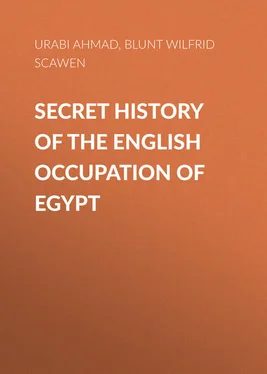Wilfrid Blunt - Secret History of the English Occupation of Egypt
Здесь есть возможность читать онлайн «Wilfrid Blunt - Secret History of the English Occupation of Egypt» — ознакомительный отрывок электронной книги совершенно бесплатно, а после прочтения отрывка купить полную версию. В некоторых случаях можно слушать аудио, скачать через торрент в формате fb2 и присутствует краткое содержание. Жанр: foreign_antique, foreign_prose, Историческая проза, на английском языке. Описание произведения, (предисловие) а так же отзывы посетителей доступны на портале библиотеки ЛибКат.
- Название:Secret History of the English Occupation of Egypt
- Автор:
- Жанр:
- Год:неизвестен
- ISBN:нет данных
- Рейтинг книги:4 / 5. Голосов: 1
-
Избранное:Добавить в избранное
- Отзывы:
-
Ваша оценка:
- 80
- 1
- 2
- 3
- 4
- 5
Secret History of the English Occupation of Egypt: краткое содержание, описание и аннотация
Предлагаем к чтению аннотацию, описание, краткое содержание или предисловие (зависит от того, что написал сам автор книги «Secret History of the English Occupation of Egypt»). Если вы не нашли необходимую информацию о книге — напишите в комментариях, мы постараемся отыскать её.
Secret History of the English Occupation of Egypt — читать онлайн ознакомительный отрывок
Ниже представлен текст книги, разбитый по страницам. Система сохранения места последней прочитанной страницы, позволяет с удобством читать онлайн бесплатно книгу «Secret History of the English Occupation of Egypt», без необходимости каждый раз заново искать на чём Вы остановились. Поставьте закладку, и сможете в любой момент перейти на страницу, на которой закончили чтение.
Интервал:
Закладка:
We were anxious, nevertheless, to see Egypt in a less conventional way than that of ordinary tourists, and, having our camping equipment with us for the longer journey, we hired camels at Suez and went by the old caravan route to Cairo. It is not necessary that I should say much of our journey across the desert. The four days spent in it alone with our Bedouin camel-men gave us our first practical lessons in Arabic – in Algeria we had been dependent wholly on a dragoman – and they laid the basis, too, of those relations with the desert tribes of Arabia which were afterwards to become so pleasant to us and so intimate. On the fifth morning we entered Cairo, greeted on our arrival at Abbassiyeh by the whistling of bullets fired by the Khedivial troops at practice, for we had unwittingly encamped overnight just behind their targets and the aim of the recruits was very uncertain, but no harm was suffered. We little thought at the time that we should ever be interested in the doings of these soldiers as a fighting army, and still less that our sympathies would one day be with them in a war against our own countrymen. I was as yet, though not perhaps even then enthusiastically so, a believer in the common English creed that England had a providential mission in the East, and that our wars were only waged there for honest and beneficent reasons. Nothing was further from my mind than that we English ever could be guilty, as a nation, of a great betrayal of justice in arms for our mere selfish interests.
Neither need I say anything in detail about Cairo, through which we passed that day without stopping longer than to ask for our letters at the Consulate. Our object was to see the country districts and not to waste time on a city already in part European, and we thought to find camping ground immediately beyond the Nile. So we rode on. We did not understand the entreaties of our camel-men that we should alight and let them and their camels go back, or realize that we were doing them an injustice by forcing them to break the tribal rule which forbade them as Bedouins of the eastern desert to cross over to the west. In spite of their expostulations we held on our way by the Kasr-el-Nil bridge and the road to Ghizeh. We had caught sight of the Pyramids and pushed on eagerly in their direction, and were only stopped by the failing light which overtook us at sunset close to the little fellah village of Tolbiya, the last but one before the Pyramids are reached. It was there that we made our halt and alighted for the first time on the black soil of the Nile, as yet hardly dry from the autumn inundation.
The good people of Tolbiya, in their hearty fellah fashion, received us with all possible hospitality. Though living on the tourist road to the Pyramids and accustomed to treat Frank travellers in some sort as their prey, the fact of our alighting at their village for a night's lodging gave us a character of guests they at once recognized. Of all the Europeans who for many years had passed their way, not one had made a pause at their doors. Thus our relations with them were from the outset friendly, and the accident served us as an introduction in the sequel to other villagers when, after a few days spent among these, we went once more on our way. We had no choice at the time but to stay where we were, for in the morning our Bedouins refused to go a mile farther with us, and, having received their hire, departed with their camels. Other camels then had to be found. So it happened that my first week in Egypt was occupied in going a round of the neighbouring village markets in search of the needed beasts, and making purchases of pack saddles and water, skins and all kinds of travelling gear for our further journey.
The fellahin at that time were in terrible straits of poverty. It was the first of the three last terrible years of the Khedive Ismaïl's reign; Ismaïl Sadyk, the notorious Mufettish, was in power; the European bondholders were clamouring for their "coupons," and famine was at the doors of the fellahin. It was rare in those days to see a man in the fields with a turban on his head, or with more than a shirt to his back. Even in the neighbourhood of Cairo, and still more in the Fayûm to which we took our way as soon as the camels were procured, I can testify that this was the case. The country Sheykhs themselves had few of them a cloak to wear. Wherever we went it was the same. The provincial towns on market days were full of women selling their clothes and their silver ornaments to the Greek usurers, because the tax collectors were in their villages whip in hand. We bought their poor trinkets and listened to their stories, and joined them in their maledictions on a government which was laying them bare. We did not as yet understand, any more than did the peasants themselves, the financial pressure from Europe which was the true cause of these extreme exactions; and we laid the blame, as they did, on Ismaïl Pasha and the Mufettish, Ismaïl Sadyk, little suspecting our English share of the blame.
The villagers were outspoken enough. Englishmen in those days were popular everywhere in Mohammedan lands, being looked upon as free from the political designs of the other Frank nations, and individually as honester than these in their commercial dealings. In Egypt especially they stood in amiable contrast with the needy adventures from the Mediterranean sea-board – the Italian, Greek, and Maltese money-lenders – who were sucking the life blood of the Moslem peasantry. Already there were rumours in the air which had reached the village of a possible European intervention, and the idea of it, if it was to be English, was not unpopular. The truth is that the existing state of things was wholly unendurable, and any change was looked to with joy by the starving people as a possible relief. England to the fellahin in their actual condition of beggary, robbed and beaten and perishing of hunger, appeared in the light of a bountiful and friendly providence very rich and quite disinterested, a redresser of wrongs and friend of the oppressed, just such, in fact, as individual English tourists then often were, who went about with open hands and expressions of sympathy. They did not suspect the immense commercial selfishness which had led us, collectively as a nation, to so many aggressions on the weak races of the world.
In the year 1876 I too, as I have said, was a believer in England, and I shared the common idea of the beneficence of her rule in the East, and I had no other thought for the Egyptians than that they should share with India, which I had not yet seen, the privilege of our protection. "The Egyptians," I wrote in my journal of the time, "are a good, honest people as any in the world – all, that is, who do not sit in the high places. Of these I know nothing. But the peasants, the fellahin, have every virtue which should make a happy, well-to-do-society. They are cheerful, industrious, obedient to law, and pre-eminently sober, not only in the matter of drink, but of the other indulgences to which human nature is prone. They are neither gamblers nor brawlers, nor licentious livers; they love their homes, their wives, their children. They are good sons and fathers, kind to dumb animals, old men, beggars, and idiots. They are absolutely without prejudice of race, and perhaps even of religion. Their chief fault is a love of money, but that is one political economists will readily pardon… It would be difficult to find anywhere a population better fitted to attain the economical end of the greatest happiness for the greatest number. In politics they have no aspirations except to live and let live, to be allowed to work and keep the produce of their labour, to buy and sell without interference and to escape taxation. They have been ill-treated for ages without losing thereby their goodness of heart; they have few of the picturesque virtues; they are neither patriotic nor fanatical nor romantically generous. But they are free from the picturesque vices. Each man works for himself – at most for his family. The idea of self-sacrifice for the public good they do not understand, but they are innocent of plots to enslave their fellows… In spite of the monstrous oppression of which they are the victims, we have heard no word of revolt, this not from any superstitious regard for their rulers, for they are without political prejudice, but because revolt is no more in their nature than it is in a flock of sheep. They would hail the Queen of England, or the Pope, or the King of Ashantee with equal eagerness if these came with the gift for them of a penny less taxation in the pound."
Читать дальшеИнтервал:
Закладка:
Похожие книги на «Secret History of the English Occupation of Egypt»
Представляем Вашему вниманию похожие книги на «Secret History of the English Occupation of Egypt» списком для выбора. Мы отобрали схожую по названию и смыслу литературу в надежде предоставить читателям больше вариантов отыскать новые, интересные, ещё непрочитанные произведения.
Обсуждение, отзывы о книге «Secret History of the English Occupation of Egypt» и просто собственные мнения читателей. Оставьте ваши комментарии, напишите, что Вы думаете о произведении, его смысле или главных героях. Укажите что конкретно понравилось, а что нет, и почему Вы так считаете.












